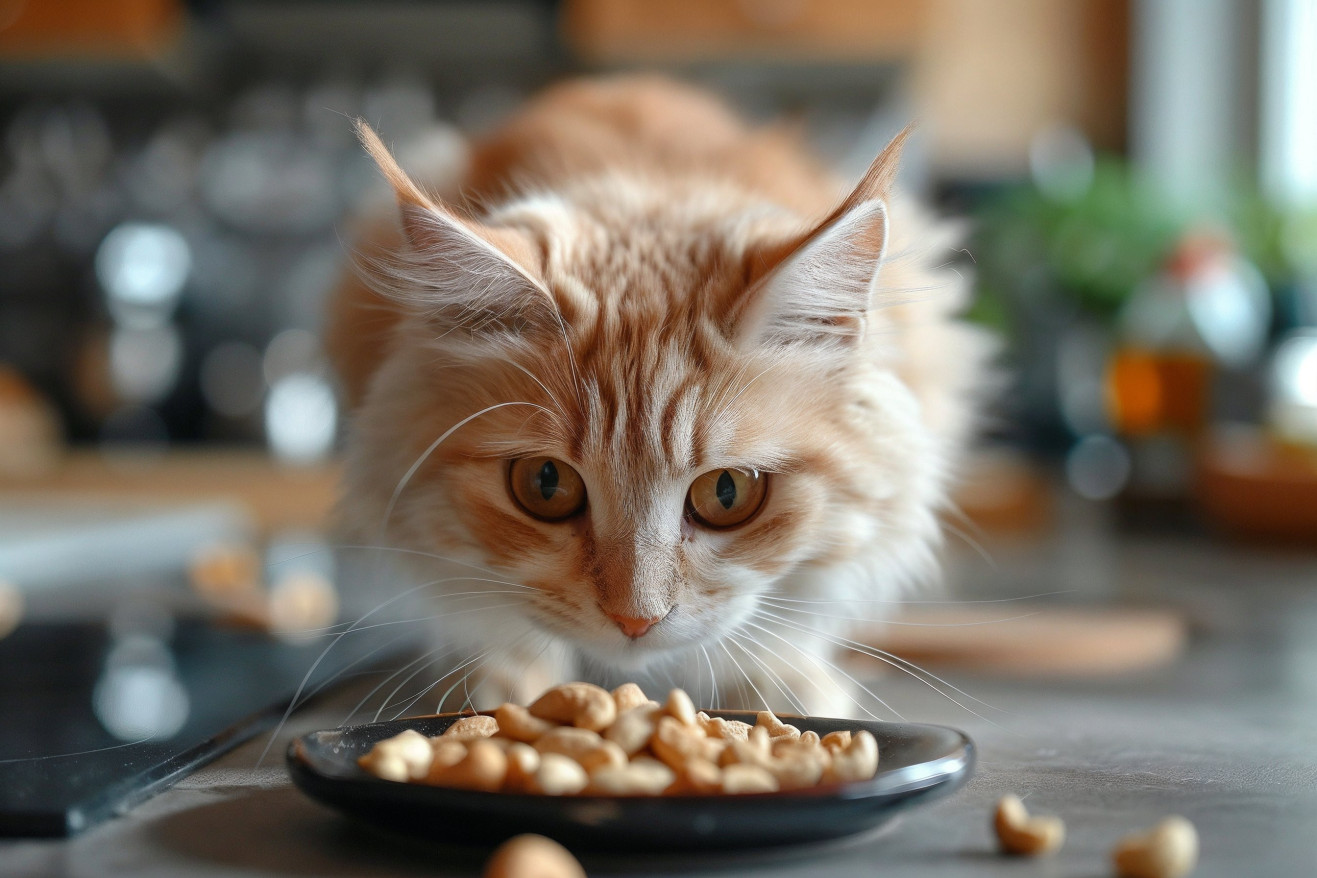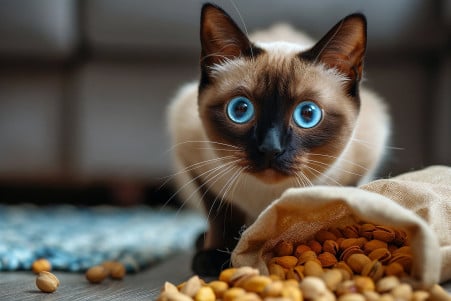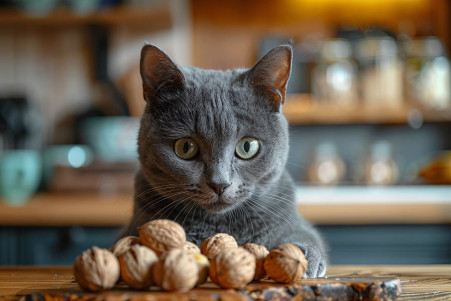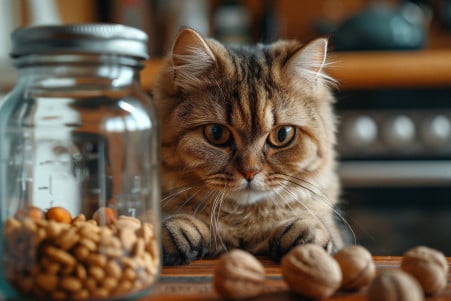Can Cats Eat Cashews? Nutritional Implications for Felines
16 February 2024 • Updated 14 February 2024

While cashews may be a delicious treat for humans, you may be wondering if your feline friend would enjoy them as well. Although cats can eat cashews because they aren’t poisonous, they aren’t good for cats. The high fat and sodium content in cashews can cause health problems like pancreatitis and obesity in cats. Therefore, if you choose to feed your cat cashews, you should do so in moderation.
This article will delve into the biological and nutritional science of feline nutrition, including a look at the latest research on feline fat metabolism and the dietary requirements of these obligate carnivores. We will then examine veterinary research and expert opinions to determine the effects of high-fat foods like cashews on cats. Our hope is to give you a complete understanding of which treats are safe and healthy for your cat.
Can cats eat cashews?
Meeting Cats’ Nutritional Needs
Cats are obligate carnivores, which means that they have a very specific dietary need: they require a diet that is high in protein and moderate in fat. Cats metabolize fat differently than humans and use it as a major energy source. This is why Today’s Veterinary Practice notes that cats require essential fatty acids, including omega-3 and omega-6, to help maintain healthy skin and coat, aid in growth, and help control inflammation.
While it’s important to make sure that cats are getting the right nutrition, including fats, in their diet, it’s also important to note that adding high-fat foods like cashews can throw off the balance of their diet. A study in PMC found that dietary fat should be managed carefully, especially in older cats, as their ability to digest fat decreases as they age.
This means that while a cat’s digestive system may be able to handle some dietary fats, it may not be able to handle the excess fats in cashews, which could lead to negative health effects.
Because cats have different metabolic pathways for different fatty acids, it’s important to consider the types of fats that are in their diet. A study from SciELO – Brazil explains that cats can’t synthesize certain essential fatty acids and therefore need to get them from their diet.
Adding non-traditional, high-fat foods like cashews to a cat’s diet can lead to an unbalanced nutrient profile and disrupt the careful balance of the cat’s dietary needs, which could lead to health problems that need to be taken into account.
Potential Dangers of Feeding Cashews to Cats
Although cashews are not poisonous to cats, there are several potential dangers associated with feeding them to your pet. According to Spot Pet Insurance, the high fat content of cashews can cause pancreatitis in cats, which can result in symptoms like fever, vomiting, and abdominal pain.
Pancreatitis is an inflammation of the pancreas that can be painful and even life-threatening for cats, causing symptoms like loss of appetite and gastrointestinal upset. In addition, cats can also become overweight from the high-fat content and excess calories in cashews.
The high sodium content of cashews is another concern. Cats are more sensitive to salt than other animals, and consuming too much sodium can lead to dehydration and even heart problems. The Animal Emergency & Referral Center of Minnesota warns that cats that eat too many salted cashews may experience increased thirst or more serious complications.
If your cat has eaten cashews and is experiencing any symptoms, it is important to contact your vet right away. In cases of suspected pancreatitis, the Animal Emergency & Referral Center of Minnesota recommends that cat owners take their pets to the vet within 12 hours. For cat owners, knowing about these dangers underscores the importance of giving cats treats that are nutritionally appropriate and support their health instead of putting it at risk.
Purr-Fect Snacks: How to Pick Healthy Treats for Your Cat
While cashews are not a good choice for your cat, there are plenty of other safe, healthy treats that can help supplement their diet and strengthen your relationship.
According to Sploot Veterinary Care, some human foods that are safe for cats to eat as treats with your vet’s approval include cooked, unseasoned chicken or turkey, beef, and certain fish, all of which are good sources of essential proteins and amino acids. Small amounts of cooked, pureed pumpkin or carrots can also help with digestion and add fiber.
It’s important to make sure you’re not overfeeding your cat, which can lead to obesity and other health problems. Vets say that treats should make up no more than 10% of your cat’s daily caloric intake.
When it comes to store-bought treats, you should make sure that you’re choosing treats that are nutritionally complete and safe. The Vets, a mobile veterinary service, recommend low-calorie treats that are free of artificial preservatives, like Temptations Classic Crunchy and Soft Cat Treats and INABA Churu Cat Treats.
By using these vet-approved treats in moderation, you can make sure that your cat is getting the balanced, varied diet they need that’s also in line with their natural carnivorous diet. These treats will allow your cat to indulge without risking their health.
A Look at Feline Evolution: Cats’ Natural Diet and Food Sensitivities
The diet of wild cats throughout evolution has shaped the dietary requirements and sensitivities of modern cats. Cats are obligate carnivores, and their natural diet is almost exclusively made up of animal meat.
A paper in Ecology and Evolution explains that although felids do eat some plant material, they are most closely adapted to a diet of animal meat based on their morphology and physiology. This specialization is due to their adaptations as predators, including their sharp teeth and short digestive system, which is better suited to breaking down animal protein than plant carbohydrates.
This means that even when it comes to non-traditional foods like cashews, cats’ diets have evolved in a way that is different from other animals. According to the ASPCA, essential nutrients like the amino acid taurine, which is necessary for cats, are only found in animal-based products.
Cats are unable to make some of the nutrients they need on their own, so they require a diet that includes animal products and have a low tolerance for plant-based products, including nuts.
Based on their evolutionary history, it appears that the dietary limitations of domestic cats are similar to those of their wild ancestors, which means that plant-based products, including cashews, are not a natural fit for them. This information can be used to help cat owners make better choices about their pets’ diets and ensure that they are sticking to the carnivorous diet that is most natural for them.
Final Thoughts: Cat Nutrition and Health
In this article, we’ve repeatedly stressed the importance of not giving cats cashews due to their high fat and sodium content. While not poisonous, cashews can cause problems like pancreatitis, obesity, and sodium imbalances. This makes it important for pet owners to stick to a cat’s natural dietary needs, which are based on their status as obligate carnivores with a need for high protein.
We hope that cat owners will work with their veterinarians to get the individualized dietary recommendations that will best meet their cats’ specific health needs. After all, the relationship between a cat and its owner is built on love and understanding, including when it comes to what we feed our feline friends.
When it comes to caring for our cats, we owe it to them to make sure they’re healthy and happy. One way we can do this is by making sure they get the nutrition they need based on their species.
After all, the treats we give them should be good for them, not bad for them, and that’s part of our larger responsibility as pet owners to create a positive environment for our feline friends.


